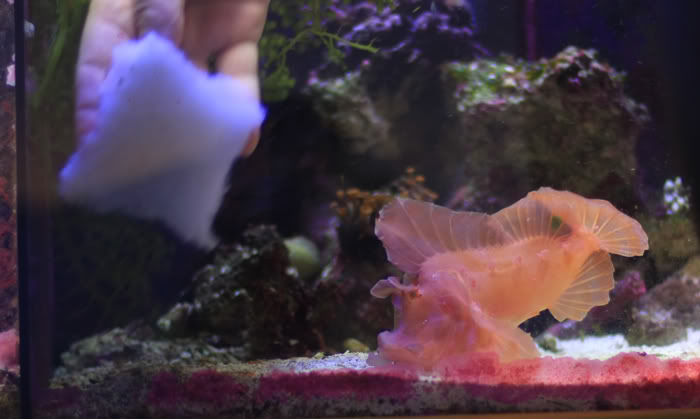"Dr. Jeremy" is right-on.
Scorpaeniforme venoms are composed of heat-labile proteins, which are denatured by the heat (we recommend +114*F, which is +45*C).
The severity of the envenomation is dependent upon a few variables: species, the number of spines involved, depth of the wound, and dwell time (the time the spines are actually in the wound). The "toxicity progression" goes like this (worst being last): lionfishes, scorpionfishes, waspfishes, stingfishes, stonefishes.
These days, most medical units treat the envenomations symptomactically rather than using antivenom. It's expensive, and isn't likely kept on hand by most ER's, esp. where there's little chance of a stonefish sting. It turns out that a guy I used to hang with back in high school is the ER director at the hospital Renee (Cranberry) works at, and I asked him if they kept the stuff in stock. Torrance Memorial is a large hospital, and as I mentioned, they don't keep it around.
The biggest worry one might have would be secondary infection, esp. if there are any fragments of the offending spine(s) left in the wound. This would be more of a concern with lionfish stings due to the long length of their dorsal spines. It helps to know that besides their dorsal spines, lionfishes possess two pelvic spines and three ventral spines that are venomous (refer to the drawing in this article:
http://www.lionfishlair.com/careguides/lionfish.shtml ).
As for "downgrading" getting stung, while we don't downplay it, we also try to get the word out that it's not as terrible as the "stories" make it out to be. I've kept scorps for over 20 years, and have never had any issues...not even a close call, altho I was "warned" once by an Eschmeyer's scorp. Just yesterday, I was cleaning one of our setups that houses five different lionfishes, a waspfish, and a scorpionfish, and altho I don't fret over getting stung, I do know where the fishes are at all times. Our fishes are all used to us, which helps a lot, altho the fuzzy dwarf pair tends to "insist" on swimming around my arm at times.
Here are some tips for working in your "lion's den":
[list type=decimal]
[*]
Always respect the fish, and know where they are at all times when working on the tank. If you happen to be performing a chore that requires a lot of your concentration, you may want to enlist the aid of a spotter to let you know if the fish is nearby (this is a perfect job for young helpers).
[*]
Never make the fish feel threatened or cornered. Perform your work deliberately and in a non-threatening manner. Get to know your fish, and let it get to know you. Lionfish are pretty intelligent and will become accustomed to you working in their box of water.
Know the warning signs that a lion has gone into a defensive posture. They will typically erect their dorsal spines and assume a head-down position, thus bringing their daggers to bear in the direction of the perceived threat.
Don’t pet the fish! This was actually meant as a joke, but I know of at least one case, where a person thought her lionfish was so puppy-like and tame that she tried to pet it and got poked for her trouble. She was unaware of the first aid for a sting, applied ice to the wound, and ended up in the ER.
[/list type=decimal]
"Back off!"


